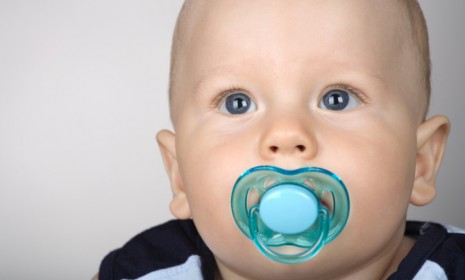Does heavy pacifier use emotionally stunt boys?
A new study suggests that popping a calming pacifier in a baby boy's mouth might dull his ability to empathize later in life

A free daily email with the biggest news stories of the day – and the best features from TheWeek.com
You are now subscribed
Your newsletter sign-up was successful
Is it time to retire baby's binky? The World Health Organization and the American Academy of Pediatrics already urge parents to break out the pacifier sparingly, warning that popping one into your baby's mouth every time he or she is upset might increase the risk of ear infections, dental problems, and breastfeeding issues. But now, a new study from the University of Wisconsin-Madison suggests that frequent use of calming pacifiers during the day can make boys more likely to develop emotional problems when they are older. Is this another big strike against the beloved pacifier? Here, a brief guide:
What, precisely, did the researchers find?
That boys and young men who were regularly given pacifiers as infants appeared more inclined than others to be emotionally stunted. At ages 6 and 7, former binky addicts were less likely to correctly copy facial expressions from a video. And college students who reported heavier pacifier use when they were little scored lower on two types of emotional tests. One measured their emotional intelligence — requiring them to make decisions based on how they think others might feel — and the other tested their ability to assume someone else's point of view — a capability stunted in people with autism.
The Week
Escape your echo chamber. Get the facts behind the news, plus analysis from multiple perspectives.

Sign up for The Week's Free Newsletters
From our morning news briefing to a weekly Good News Newsletter, get the best of The Week delivered directly to your inbox.
From our morning news briefing to a weekly Good News Newsletter, get the best of The Week delivered directly to your inbox.
Why would pacifier use stunt emotional growth?
The researchers can't be sure, but they have a theory. Babies learn to express their emotions by imitating the facial expressions of their parents and others. "By reflecting what another person is doing, you create some part of the feeling yourself," says Paula Niedenthal, a lead author of the study. "That's one of the ways we understand what someone is feeling." Baby boys who are busy sucking on pacifiers, the theory goes, can have a harder time manipulating their faces and learning to express themselves. The funny thing is, the correlation doesn't seem to apply to little girls.
Why not girls?
The researchers believe that girls often develop emotional responses earlier — pre-binky. Their parents might also interact with them differently, encouraging girls to express their emotions in many ways, not just imitation, while sending boys the message that they need to keep their feelings more bottled up. Moms and dads often "want their girls to be emotionally sophisticated," says Niedenthal. "Because that's a girly thing." But because parents often encourage boys to be unemotional, "when you plug them up with a pacifier, you don't do anything to compensate and help them learn about emotions."
A free daily email with the biggest news stories of the day – and the best features from TheWeek.com
Should parents avoid pacifiers?
That's a touchy question, and the answer isn't a simple yes or no. "Probably not all pacifier use is bad at all times," Niedenthal says. "Nighttime pacifier use doesn't make a difference, presumably because that isn't a time when babies are observing and mimicking our facial expressions anyway. It's not learning time." But remember, says Gwen Dewar at Baby Center, that even though researchers found a link between emotional problems and pacifiers, it isn't necessarily a causal relationship. "Maybe little kids are more likely to be given pacifiers if they have emotional problems to begin with — and these problems persist in later life."
Sources: Baby Center, Fox News, Jezebel, Medical News Today, Mommyish